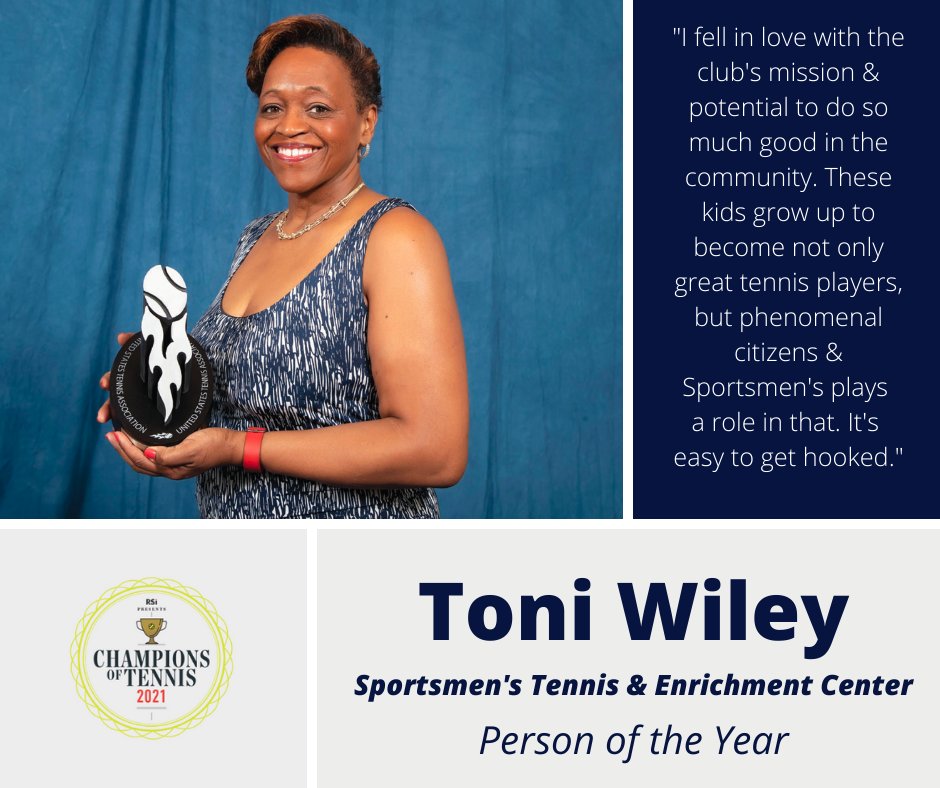When Toni Wiley joined the award-winning Sportsmen’s Tennis & Enrichment Center as a consultant and board member in 2007, she said she planned to help the Dorchester, Mass., facility “right the ship” before moving on to the next challenge.
Yet while sharing best practices for managing expenses and operations related to the 53,000-square-foot building owned by the nonprofit organization, Wiley experienced an unexpected revelation.

“I fell in love with the club’s mission and potential to do so much good in the community,” says Wiley, who is RSI’s Person of the Year for her dedicated leadership as executive director of Sportsmen’s since 2008, and for her influence in this industry. “These kids grow up to become not only great tennis players, but phenomenal citizens, and Sportsmen’s plays a role in that. It’s easy to get hooked. This is exactly where I want to be and where I want to make a difference.”
Founded in 1961, Sportsmen’s earned the distinction as the first nonprofit indoor tennis club built by and for the African-American community. These kids grow up to become not only great tennis players, but phenomenal citizens, and Sportsmen’s [Tennis & Enrichment Center] plays a role in that. It’s easy to get hooked. The year-round tennis center, with seven indoor and seven outdoor courts, provides academic, wellness and social development programs alongside recreational and competitive tennis instruction for more than 400 adult members and 5,000 juniors.
While Sportsmen’s role in improving life opportunities for youth in Boston’s Blue Hill Corridor is legendary, Wiley says it took several years for the center to rebound from financial struggles that threatened to close its doors during the early days of her tenure.
“It’s great to own your facility and be in charge of your own destiny, but you can’t pay the electric bill with goodwill—and operating expenses never stop,” says Wiley, who has led the charge for new philanthropic support to cover low-cost and free programs for families in need. In addition, adult recreation and competitive tennis programs welcome diverse players and help fund its mission.
Partnerships have also contributed to its breadth of programming. With Wiley at the helm, Sportsmen’s and the Boston Police Department implemented “Volley Against Violence,” which has served as the model for the USTA’s Serve & Connect program. In 2015, the center launched its Center for Community Wellness in partnership with Brigham and Women’s Hospital to o er a free fitness center open to the public, as well as health and nutrition programs to promote well-being and prevent chronic illness.
Sportsmen’s is also a proud partner of the Boston Public Schools, one of the largest members of the USTA’s National Junior Tennis & Learning Network and the only New England chapter to receive its ICON Award.
For her part, Wiley was awarded the 2019 Eve F. Kraft Community Service Award—one of the USTA’s highest honors—and serves as a member of the USTA New England Board of Directors, USTA National Diversity & Inclusion Committee and American Tennis Association board.
But for Wiley, it’s all about keeping the children of her community front and center.
“We’ve had kids that have really struggled to find their way, and those are the success stories that stay with you,”
notes Wiley, who grew up just down the street from the center. “You’ve got to have a job that feeds your soul. I’m
glad this is mine.” —Cindy Cantrell


